Story highlights
Catire Walker and Noël Zemborain put their four children in a VW bus to drive from Buenos Aires to Philadelphia
Their trip is all about family and faith
Their destination is Philadelphia, where they'll see Pope Francis, attend a festival of families
The freewheeling Volkswagen bus, painted a Caribbean turquoise, rolls down Guatemala’s CA-9 highway. Hot wind blows in and out of every open window, and the noise from the rear engine is loud. But no one seems to mind.
Sandwiched between four kids in the back, I can’t help but think these travelers’ attitude might be mistaken for flower power. But this is no magic bus on a hippie trip. This family is on a mission rooted in their Catholic faith.
Catire Walker, 41, and his wife, Noël Zemborain, 39, packed their children, camping gear and a few belongings in March and left their home in Buenos Aires on a daunting 13,000-mile journey through 13 countries.
Their family and friends called them crazy. Maybe they were. But they figured it was about time that they did something crazy. About time that they devoted more time to what mattered most: family.
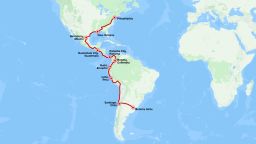
Their final destination is Philadelphia to see the Pope.
Pope Francis, who has made family one of his hot button issues, is visiting the United States for the first time later this month. The Walkers plan to attend the 2015 World Meeting of Families, a central event of the papal visit. The VW bus is plastered with a sticker emblazoned with the event’s logo. Everywhere the family goes, the curious stop and ask.
Faith, for the Walkers, has never been about church and its rituals but about the everyday occurrences of life. In Francis, they finally saw a pope who understood ordinary people like them, a pope who talked about things no pope had discussed openly before.
Besides, they felt immensely proud that Francis was a fellow Argentine. They had followed Jorge Bergoglio closely when he was archbishop of Buenos Aires and had even seen him up close right after he was named Pope.
They were in Rome on a business trip and stood among the crowd at the Vatican. When Francis drove by in the Pope Mobile, Catire screamed “Jorge!” and held up their youngest child, Carmin, then only 10 months old. One of the security guards carried the baby past the barricade and lifted her up so Francis could kiss her.
Catire gave a two thumbs up. For Noël, time stood still. It was like meeting a rock star.
The journey to see Francis in Philadelphia, they both thought, would be well worth it.
In late July, I caught up with the family in Guatemala City. They cleared a seat for me in the back of the van. Squeezing in alongside the children, ages 3 to 12, I noticed they were occupied with various forms of entertainment and homework and oblivious to how long it might take to reach the next destination: the Mayan ruins at Tikal. They had grown accustomed to long hours sitting in their bus, which they treat like the family’s fifth child and named Francisca.
After El Papa, of course.
A humbling journey
We drive down from the cooler climes of Guatemala City into the country’s sultry plains. Catire’s left hand steers the wheel of the Kombi, the term for the microbus that is most common in Latin America. His right hand clutches a metal cup containing mate, a popular herbal, caffeine-infused potion that gets him going every morning.
Noël pulls down a wooden laptop desk from the dashboard that often doubles as a cutting board. She opens up her computer, trying to figure out why the screen no longer works.
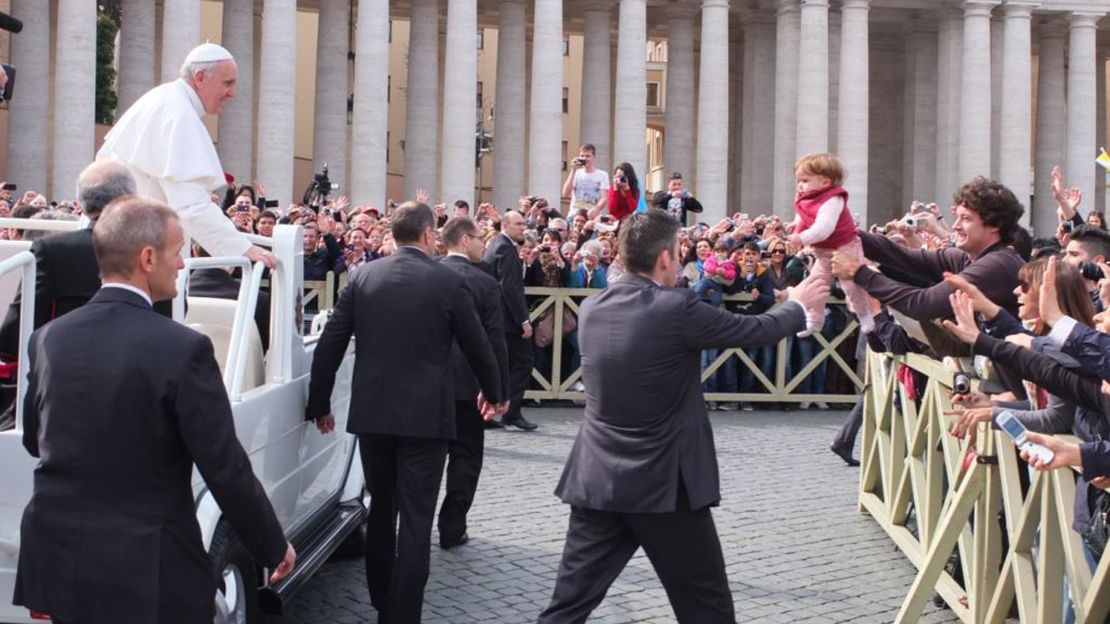
The Walkers don’t know how far they will get today or where they will sleep tonight. This is how it has been in their months of travel on a tight budget. They raised a few dollars through a crowdsourcing site but mostly, they depend on the kindness of strangers, many of whom open up their homes and become lifelong friends.
The journey has been humbling, Noël tells me.
“We have learned how to ask for help,” she says. “We have learned how to be grateful, how to live with very little. And just to let go and not to try and always control everything.”
Along the way, they’ve hit a few snags. They were nervous leaving the VW bus unaccompanied on a ferry to cross from Panama to Costa Rica. Even more frightening was driving into the catastrophic floods in Chile’s Atacama Desert and being forced to sleep in not-so-safe places when they had mechanical troubles.
Dimas, 8, has been chronicling the family’s adventures in a journal that he shares regularly with his classmates in Buenos Aires. Even in the herky-jerky back seat, he manages to pen each word between the lines of his notebook: “We crossed into El Salvador and then our Kombi broke down. …”
Cala, 12, opens a cream-colored tin painted with butterflies, thistles and lilies. It was once filled with cookies, made by a woman named Monica Ahumada who gave it to the children when they were in Concon, Chile. They were struck by Monica’s generosity – she had lost both her sons at a young age and lived alone in a tiny house. Yet she had taken in the Walkers.
Now the tin holds Cala’s knitting needles. She picks them up and continues making a scarf for Rosa Maria, the mother of the man who hosted them in Guatemala City.
Mia, 5, is lost in her coloring book, and the youngest, Carmin, 3, cannot sit still. She clutches her Winnie the Pooh stuffed animal in one hand and a pack of Club Social crackers in the other.
The kids decorated the inside of the van with origami birds. By the door is a list of countries that are on their route with check marks by the ones they have already visited: Chile, Peru, Colombia. …
They have been taking turns putting flag stickers on the back of the bus at each border crossing. Cala did the honors in Guatemala; Mia is excited that she will get to do the next one.
But we drive only about 100 miles when Francisca begins to hiccup. Catire tries to rev up the engine. It lets out one last gasp before falling silent.
An unforgiving sun beats down on Catire as he wrestles with the engine. Cars whiz past us without slowing down – few people are willing to stop along this highway frequented by gangs and drug cartels.
But one truck driver does. He introduces himself as Oscar.
“Where are you going?” he asks.
“We are traveling from Buenos Aires to Philadelphia,” says Catire. “To see El Papa.”
Oscar has the same look of incredulity that others have had. He doesn’t quite know what to make of the family in the Kombi.
“You are going to see El Papa?” Oscar says, his eyes lighting up at the prospect of seeing the populist pope who single-handedly has reinvigorated the faith of thousands of Catholics across the globe.
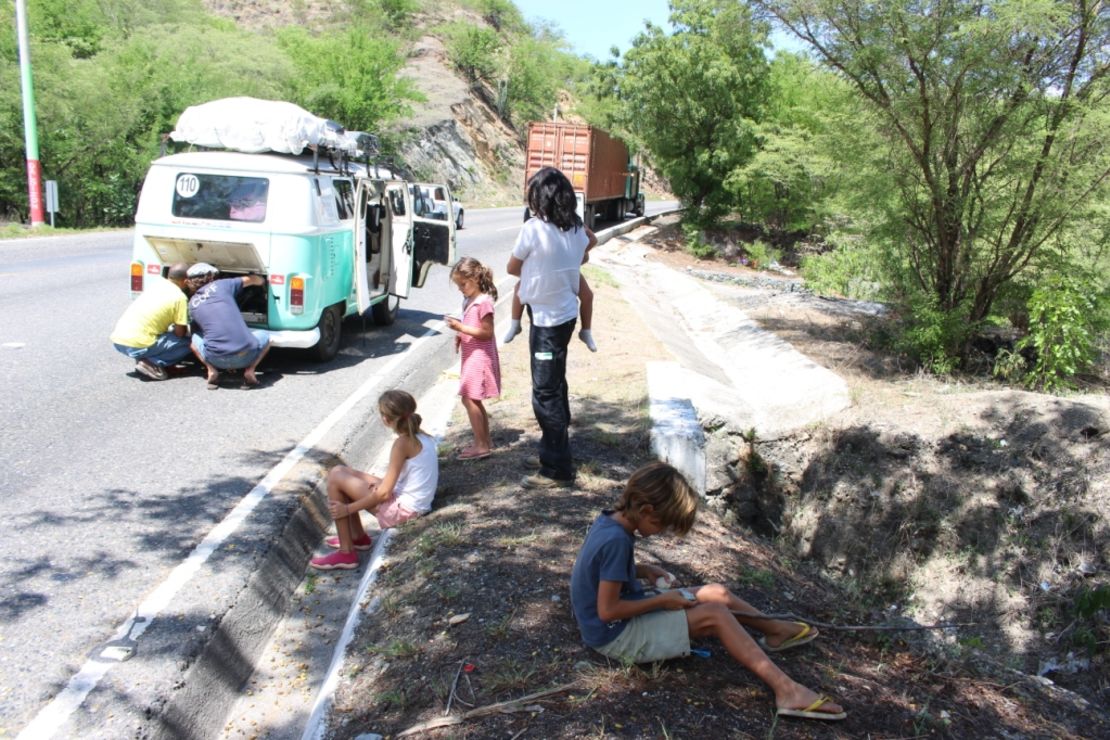
Oscar agrees to tow the Kombi to nearby Rio Hondo, where Catire tries one more time to get the engine going. That was one of the reasons he had bought the VW bus – it was simple to fix.
“Yay!” the kids cry out when the Kombi starts back up. We climb back in, but it’s only minutes before Francisca gives out again. This time we are lucky. We are at a gas station.
Faith and family
In Ecuador, someone gave Carmin a toy and said: Take it home with you.
I don’t have a home, Carmin said.
The last night the Walkers spent at “home” was March 10. It felt as though they were leaving on a long vacation, except there would be no returning to the house they’d set up with the things they loved: a Lichtenstein print in the living room and shelves brimming with books.
Catire worked as a manager in food services, Noël in communications and marketing. They were living a good life.
They’d met on a whirlwind weekend skiing trip in Mendoza and married a short while later in 2001. They both had adventure in their blood and when their eldest, Cala, was still very young, they uprooted themselves and moved to Barcelona, Spain.
When they got homesick and returned eight years later, they felt lost in the urban chaos of Buenos Aires. They missed their friends and the calmer lifestyle of Barcelona. It was taking a toll on their relationship.
They sought solace in the church and attended a retreat for couples run by a priest who had studied under Pope Francis. It turned out to be transformative.
The priest forced Catire and Noël to look inward. “Look at your flaws,” he told them and consider the Pope’s words:
“We have complaints about each other. We are disappointed in each other. … Forgiveness is vital to our emotional health and spiritual survival. Without forgiveness, a family becomes a bastion of conflicts and grievances. Without forgiveness, a family gets sick.”
Catire and Noël met a couple at the retreat who’d been together 25 years but could not marry in the Catholic Church because they both had been divorced. It’s an issue that Pope Francis has raised and will be discussed at the Synod of Bishops session on the family in October.
“The Pope,” said Catire, “has brought the church to a point of inflection.”
It’s a much needed point of inflection, if you ask Catire and Noël, who like many Catholics felt disillusioned by the church’s unwillingness to debate prickly issues such as abortion and same-sex marriage. They were not ones to follow the church blindly.
“I’m not going to believe contraception is bad just because the church says so,” Catire said. “I am not anybody to judge others.”
He feels strongly about the sanctity of life and believes same-sex marriage is not natural. But he believes it is wrong for the church to pass sweeping judgment. He likes that Pope Francis is open to discussion.
By the time Francis was named Pope, Catire and Noël had left their small flat in the heart of Buenos Aires and rented a bigger house farther out in tree-lined San Isidro. Their marriage was strong, and they had material comfort. But they felt a void.
They shuttled their kids to rugby matches and hockey games. Catire came home late from work, Blackberry in hand.
They had always dreamed of taking a long vacation together, to spend time as a family. Last winter, they had the same thought: “Why don’t we do that family trip now?”
When they found out about the papal visit, their decision became a no-brainer.
“What’s eight months of your life?” Noël laughed.
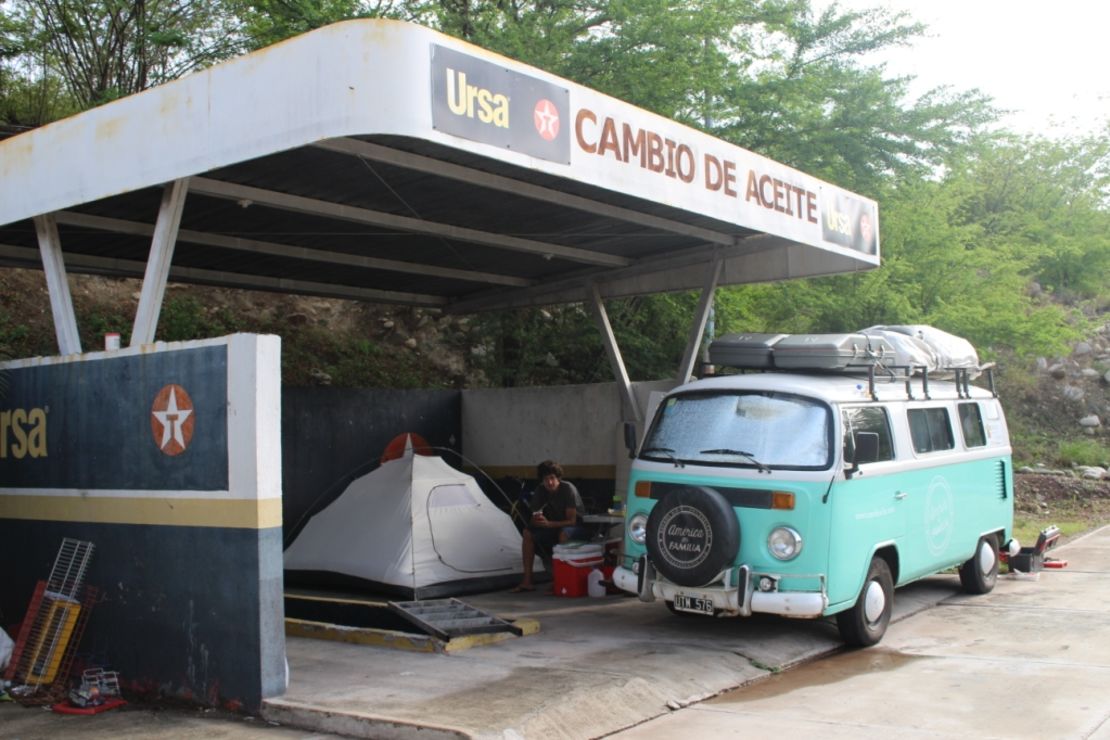
They told the kids at Christmas. That’s when it all became very real.
They sold their car and dipped into their savings to make the trip happen. Noël began emptying the house, packing up the things they thought they might need when they return to Argentina. She took boxes over to her grandmother’s farm and stored them with the machinery and tractor.
She and Catire realized then the excess of their possessions and thought again of the Pope’s words; about living simply.
Their intention was not to become martyrs, but they wanted their children to experience a world outside their neighborhood, to realize that life was not Disney. They knew that sometimes, the journey would prove uncomfortable. They didn’t have enough money to plan their entire trip so they decided they would work it out along the way.
“If we had waited for a complete budget, we would still be waiting,” Noël said. “We still need $10,000 more just for the return trip to Buenos Aires.”
Noël decided to dedicate their trip to Our Lady of Lujan, the patron saint of Argentina. On March 7, they attended a send-off Mass in Lujan. Then they were off.
Today’s lesson: Patience
Almost 10 hours after I joined them in the bus, clouds are starting to form, dark and heavy. A storm is heading our way. Catire and Noël decide it’s best to sleep at the gas station for the night. It’s safer. The next morning, they will see about fixing the Volkswagen.
Catire knew it might have problems. It’s a 1980 model that he found for $3,000 – cheap as far as car prices go in Argentina. They had seen spectacular motor homes and larger vans but were drawn to the Kombi.
It reminded them of their childhoods, when so many people drove them. And Noël loved how the entire Hoover family in the comedy “Little Miss Sunshine” squeezed into a bright yellow Volkswagen bus for their road trip. Besides, it was iconic, a symbol for an entire generation of free spirits.
The van Catire bought was painted a drab brown and needed work. His brothers helped him fix it up and outfit the interior to suit a family of six. It was the only affordable way to get to Philadelphia, though not always reliable.
This is the third time the family is spending a night at a gas station, Noël tells me.
Catire begins to unpack everything we need: tents, air mattresses, camper’s bench and utensils. He fires up a small stove to cook corn and a batch of rice with canned black beans.
“Are we going to sleep here?” asks Mia.
We pretend we are on a fun camping trip. Never mind that we are about to eat dinner in a mechanic’s bay slick with oil. Rain begins to fall and once in a while, lightning illuminates the sky. Monster trucks hurtle past us on the highway.
This, too, is a part of Catire and Noël’s faith; their children are learning values on this journey. Today’s lesson: patience.
“Our expectations are that our children will remember us living as a family on this trip,” Noël says.
We finish dinner and put all the dirty dishes out in the rain. Noël says she will wash them when the sun comes up.
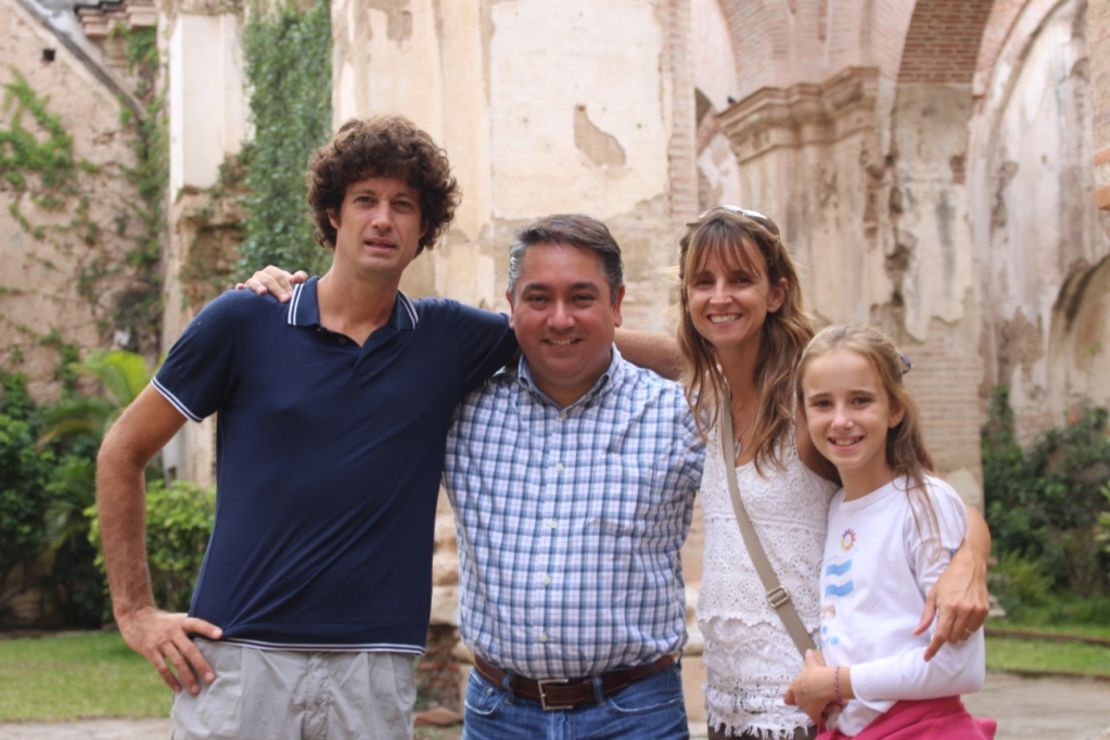
Carmin and Mia climb into the very back of the bus to sleep. Dimas and Cala zip up in a tent.
Catire tells me he has learned a lot about his children on this trip. That Cala is fiercely independent and Dimas gets frustrated being the only boy among three sisters and misses his friends more than the others. Mia, the third child, needs the most attention and often has anger fits. In Buenos Aires, he punished her for misbehaving. But on this trip, he has been softer and tried to understand her need to be noticed.
And, he says, he has a bolder appreciation for nature.
“Where we live is part of our religion,” he says. “The plants, sky, oceans, animals, birds – God gave them to us. We have to take care of them. The Pope is criticized for talking about the environment, about climate change, but he is right to do this. If we kill nature, we kill ourselves.”
In April, the Walkers witnessed an environmental disaster in Chile. They were driving through the Atacama Desert, one of the driest regions in the world, when torrential storms flooded the area. Water gushed down valleys, triggered mudslides and cut off entire villages.
“It was hell,” Noël says. And yet another place where their faith was strengthened.
People told them to turn around and leave, but Catire decided to help out with relief efforts. The family stayed with a woman named Angela Boggioni, who, in the middle of disaster, took care of them.
Noël shows me the note Angela wrote to the Walkers. “When our eyes saw only despair … I found you. You brightened our lives. I think God put you in our way. To take care of you has served to refresh our souls.”
It is getting late. I find a spot in the tent with Cala and Dimas and fall asleep thinking about Catire and Noël’s admiration for the Pope.
The next day, they pay $200 to get the van towed back to Guatemala City with all of us inside. We spend the next few days at the home of Allan Higueros, whom Noël connected with through a friend.
The news is bad: The Kombi will take many days to fix. The journey has come to a temporary halt.
After the breakdown
Catire and Noël spent over two weeks in Guatemala City before they could get going again. I had to return to Atlanta but have kept up with their travels via text messages, their Facebook page and the blog Noël writes about the journey to Philadelphia. The children are excited that they are finally in the United States. They crossed the border Sunday and made it to Port Isabel, Texas, where they are staying with a friend. All four kids stuck the final flag of stars and stripes on the bus.
From Texas, they will drive east through Louisiana, Mississippi, Alabama and Georgia. I hope to see them again in Atlanta.
I was struck by their kindness and sincerity. They need not have told me their faith was tangled up in the web of everyday life. I saw it firsthand.
Before I left Guatemala, I asked them what they would say or do if they were to come face to face with Pope Francis. Noël wants to give him a hug. Catire said he would like to thank him for increasing his hope in mankind.
And what did he think the Pope would say if he found out they had traveled in an antiquated Volkswagen bus all the way from Buenos Aires to see him?
“You are crazy.”
After Philadelphia, the Walkers want to visit New York. Then they hope to fly back to Argentina. As for Francisca? They can’t leave her behind, not after all this. She will be put on a ship to make the long journey back home.























